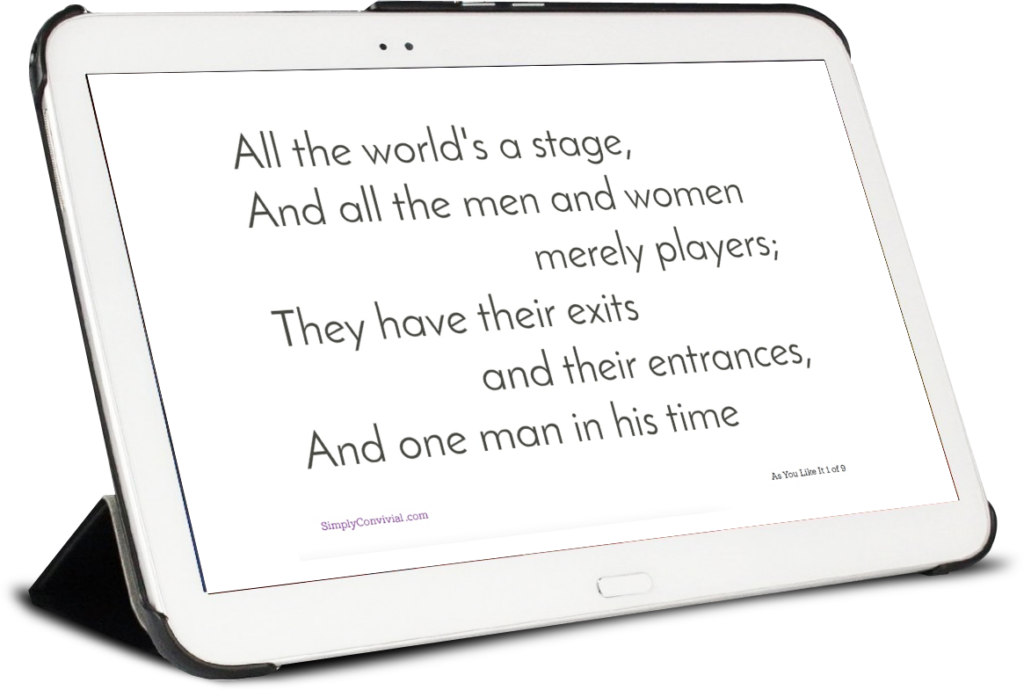Shakespeare doesn’t have to be scary or intense to incorporate into your homeschool. The stories are timeless, the language is beautiful, and they are chock full of ridiculous characters and jokes that are sure to make everyone laugh. Yet, they also demonstrate an understanding of the human condition and human relationships that make them a keystone in the English literary tradition.
We do Shakespeare in about 10-15 minutes a chunk, twice a week, and in this way we read and play with 3 plays a year.
Here’s what we did for Much Ado About Nothing last year.
Shakespeare for Kids: Much Ado About Nothing
Much Ado About Nothing is my favorite Shakespearean comedy, and a fun one to introduce to kids. It is lighthearted, the villainy is character-assassination rather than violence, and there are plenty of Shakespearean insults to go around.
It is a timeless battle-of-the-wits romance, with pranks and tricks bringing both ruin and love.
Step 1: Introduce Much Ado About Nothing
It doesn’t spoil the story to know the ending before you begin, at least not with Shakespeare.
Before jumping into the real-deal Shakespeare (which you should definitely do with elementary kids), read a children’s retelling. In these retellings, the children are more likely to get the jokes, see the humor, and grasp the plot. That gives them a huge leg up when they’re in the thick of the Shakespearean language later.
While Lamb’s and Nesbit’s collections of retellings are classics, my favorite is found in the [collection by Tina Packer]. Although it has fewer illustrations, much of the dialog is directly quoted from the original, which helps the kids warm up to the language.


Step 2: Memorize Much Ado About Nothing Famous Lines
The best way to fall in love with Shakespeare’s stories and style is to memorize sections. Familiarity breeds affection, not contempt, and when the children “own” little bits of the play, they get quite excited when they recognize the scene in a production or read-aloud.
That’s why it’s best to start with the memory portions – before reading the whole play or watching a movie of it, give them little hand-holds.
Here are the selections we chose for memory:
Benedict:
[pullquote align=”center”]
I did never think to marry:
I must not seem proud: happy are they that hear their detractions and can put them to mending.
They say the lady is fair; ’tis a truth, I can bear them witness;
and virtuous; ’tis so, I cannot reprove it; and wise, but for loving me;
by my troth, it is no addition to her wit, nor no great argument of her folly,
for I will be horribly in love with her. I may chance have some odd quirks and remnants of wit broken on me,
because I have railed so long against marriage: but doth not the appetite alter?
a man loves the meat in his youth that he cannot endure in his age.
Shall quips and sentences and these paper bullets of the brain awe a man from the career of his humour?
No, the world must be peopled. When I said I would die a bachelor,
I did not think I should live till I were married.
[/pullquote]
Prince:
[pullquote align=”center”]
I have known when there was no music with him but the drum and the fife; and now had he rather hear the tabour and the pipe: I have known when he would have walked ten mile a-foot to see a good armour; and now will he lie ten nights awake, carving the fashion of a new doublet. He was wont to speak plain and to the purpose, like an honest man and a soldier; and now is he turned orthography; his words are a very fantastical banquet, just so many strange dishes. May I be so converted and see with these eyes? I cannot tell; I think not: I will not be sworn, but love may transform me to an oyster; but I’ll take my oath on it, till he have made an oyster of me, he shall never make me such a fool.
[/pullquote]
Next time we do this one, I’ll add in a Dogberry selection, too, because he’s bound to be the kids’ favorite character.
[pullquote align=”center”]
Dost thou not suspect my place? dost thou not suspect my years? O that he were here to write me down an ass! But, masters, remember that I am an ass; though it be not written down, yet forget not that I am an ass. No, thou villain, thou art full of piety, as shall be proved upon thee by good witness. I am a wise fellow, and, which is more, an officer, and, which is more, a householder, and, which is more, as pretty a piece of flesh as any is in Messina, and one that knows the law, go to; and a rich fellow enough, go to; and a fellow that hath had losses, and one that hath two gowns and every thing handsome about him. Bring him away. O that I had been writ down an ass!
[/pullquote]
Depending on the age of the group I had, I’d abridge the sentences with ‘ass,’ but it is funny.
My husband’s favorite line to use with the kids in daily life is Dogberry’s question to the watch: “Are you good men, and true?”
Whereas my favorite line (and one I contemplated putting on a birth announcement, if I ever did such a thing): “The world must be peopled!”
Sign up and get instant access to all the Shakespeare memory sheets and lesson plans I’ve created to date.

Step 3: Watch a Much Ado About Nothing Movie or Live Production
The classic version suitable for watching with children is Kenneth Branagh’s version with Emma Thompson. Skip the superfluous introductory scene with bare bottoms and, although there is an window-scene, the people are clothed and, in my experience and opinion, exactly what is happening beyond inappropriateness goes over the kids’ heads.
If you want to watch multiple versions with adults and compare interpretations, I also highly recommend Joss Whedon’s recent version. However, because the play is set as a modern drunken party, there is more inappropriate behavior than in the Kenneth Branagh version.




Step 4: Listen to Much Ado About Nothing
I highly recommend that, instead of reading the Shakespeare play aloud yourself, you let the professionals do it for you. They are professionals for a reason. The more fluently and comfortably the lines are said, the easier they are to understand. Plus, most of the audio versions of Shakespeare plays are read by multiple people, so you get the affect of audio drama.
If you have kids who are fluent readers, another great idea is to have them read along in their own copy. I prefer the Dover Thrift editions for kids to follow along because they’re light-weight and do not contain explanations of the many puns.
If your kids aren’t fluent readers, having them color a coloring page while they listen is a good option.
When we listened to Much Ado About Nothing, I chose the Archangel version from Audible.






Step 5: Play Much Ado About Nothing
The best reinforcement and review is play.
The kids can make an illustrated comic strip, play the storyline with Playmobil figures or finger puppets, or act out a scene together (I bet they pick Dogberry’s scene).
Even simply having the students draw a single illustration of their favorite scene, captioned with a quote (which they will likely need help locating), is a great activity for wrapping up a Shakespeare study.
Shakespeare Lesson Plans
As we study Shakespeare plays together in our homeschool, I am making available our lesson plans and resource lists. Here are the links to each of the plays we’ve studied so far. Included in each one is a downloadable pdf set with not only the lesson plans, but also the printable quote cue pages we use for memorizing select lines from each play!
- How to teach Shakespeare to kids in 5 easy steps
- Comedy of Errors Lesson Plans
- Henry V Lesson Plans
- Hamlet Lesson Plans
- Julius Caesar Lesson Plans
- Taming of the Shrew Lesson Plans
- The Tempest Lesson Plans
- Macbeth Lesson Plans
- Merchant of Venice Lesson Plans
- A Midsummer Night’s Dream Lesson Plans
- Much Ado About Nothing Lesson Plans
- Mystie chats about enjoying Shakespeare in your homeschool on Your Morning Basket with Pam Barnhill







What ages do you recommend starting Shakespeare with kids?
Membership created from mystie’s import.
The quote you attribute to the prince (“I have known when there was no music…” ) is by Benedick in Act 2 Scene 3. Just FYI!